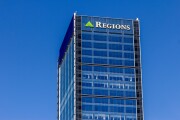For the second time in seven years, Regions Bank is being penalized by the Consumer Financial Protection Bureau for charging customers with allegedly illegal overdraft fees.
This time, the banking arm of Regions Financial was ordered to pay a civil money penalty of $50 million and refund at least $141 million to customers who were charged a type of overdraft fee that was levied on certain ATM withdrawals and debit card purchases.
The consent order — which is one of the highest-dollar overdraft-related penalties issued recently by the CFPB — states that Birmingham, Alabama-based Regions charged about $141 million of so-called "authorized-positive fees" from August 2018 through July 2021.

Such fees are charged when there is enough money in an account to complete an ATM or debit card transaction, but not enough money when the transaction actually posts to the account. Under the consent order, which was made public Wednesday, the CFPB banned Regions from charging authorized-positive fees, though Regions said it has not assessed them in over a year.
The CFPB characterized the charges as "surprise overdraft fees" and accused the bank of using "complex and counterintuitive overdraft practices and manipulations" that made it hard for consumers to avoid such fees. The agency alleged that Regions' leadership team continued to assess such charges for years even after being warned that the practice was unlawful.
"The bank's unintelligible and manipulative processes meant that even consumers closely monitoring their account balances and carefully calibrating their spending in accordance with the balances shown could not reasonably avoid surprise overdraft fees," the CFPB stated in a press release announcing the consent order. "Even Regions Bank's own employees could not explain to customers why they incurred the overdraft fees."
Regions did not admit to any wrongdoing. In its own press release, the $161 billion-asset bank said it "disagrees with the CFPB's characterizations," though it "cooperated with the investigation."
"We are pleased to resolve this matter and look forward to building further on our commitment to help customers reach their financial goals," Chief Legal Officer Tara Plimpton said in the release.
Regions' overdraft practices have drawn attention from the CFPB before. In April 2015, the consumer bureau
Wednesday's consent order is the latest example of the CFPB's
In the past year, dozens of banks have overhauled their overdraft programs, including a handful that have ditched the fees altogether. An American Banker
Regions is on the growing list of banks that have tweaked their overdraft programs. Since the start of the year, the bank has stopped collecting NSF fees, eliminated overdraft protection transfer fees and lowered the daily cap on overdraft fees to three for all consumer accounts and some business accounts.
This month, Regions also launched a low-cost line of credit of $50 to $500 for qualified customers. Next year it plans to introduce a "grace period" feature that would give customers more time to make deposits and avoid overdraft fees, according to a Regions spokesperson.
Regions said Wednesday that its annual revenue from overdraft and NSF fees has declined by more than $175 million since 2011 as a result of the changes it has made over time.
The company collected $306 million in consumer overdraft-related fees in 2020 and $300 million in such fees in 2021, call report data shows. Through the second quarter of this year, consumer overdraft-related fees totaled $156 million, compared with $147 million during the first two quarters of 2021, according to call report data.
The "authorized-positive fee" at issue in the consent order affected about 5% of Regions' total customer base, the bank spokesperson said.
Although some experts say the prevalence of such charges is probably small compared with other overdraft-related fees, the New York State Department of Financial Services this summer
While there has been some progress made on overdraft reform, more work is needed, ideally in the form of rule-making and legislation that would ban such practices altogether, said Chi Chi Wu, a staff attorney at the National Consumer Law Center.
One thing that's clear: The CFPB "has its eyes set on dealing with overdraft abuses," Wu said.
"I think some of these banks see the handwriting on the wall and they're getting ahead of it, and that's good," she said. "That is a positive result."






